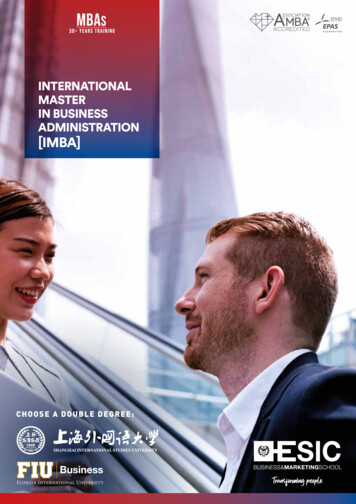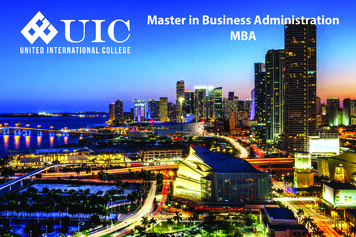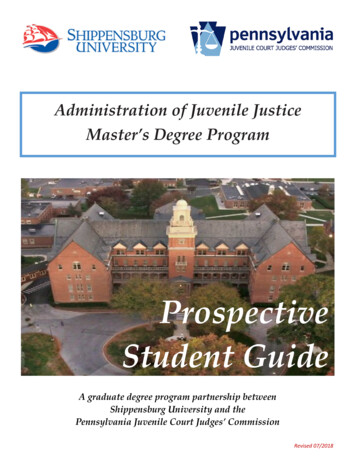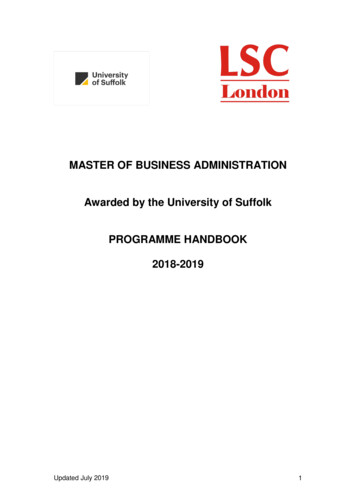
Transcription
MASTER OF BUSINESS ADMINISTRATIONAwarded by the University of SuffolkPROGRAMME HANDBOOK2018-2019Updated July 20191
Upon request to your ProgrammeAdministrator this handbook can beprovided in an alternative format.Updated July 20192
CONTENTS PAGETitlePurpose of this handbookWelcomeProgramme Team and RolesExternal ExaminersYour Contact DetailsYour ProgrammeProgramme StructureYour StudyTimetable and InductionLearning and TeachingEmployability SkillsLibrary and Learning ResourcesVirtual Learning EnvironmentAssessmentExtenuating CircumstancesAcademic AppealsAssessment RegulationsAssessment SummaryFeedbackRPLConfidentialityUnfair Practice and PlagiarismAttendance PolicyStudent 18242424242627Full Module Specs28Updated July 20193
PURPOSE OF THIS HANDBOOKThis handbook provides you with a detailed introduction to your programme.You will find details of what you will study and how you will be assessed, thesupport that will be available to you, and information on other opportunitiesavailable whilst you are studying. An updated version of this handbook isproduced each year – you will be able to access the latest versionelectronically on the University’s Online Learning Environment, Brightspace.This handbook should be read in conjunction with the online LSC University ofSuffolk Student Handbook which provides more general information andguidance about: LSC and University of Suffolk (including facilities and resources and keypoints of contact)Making the most of the learning opportunities available to youManaging your studyThe support services available to youArrangements for listening and responding to your feedbackWays in which you can get involved in improving the student experienceat the UniversityUniversity regulations, policies and procedures.If you cannot find the information you need in this handbook, further informationcan be found on MySuffolk and in the online Student Handbook, where the mostup-to-date versions of general information is made available electronically(including all University policies and procedures). Alternatively, please ask amember of your programme team who will be happy to help you.Updated July 20194
WELCOME STATEMENT FROM THE PROGRAMME LEADERWe are pleased to welcome you to the MBA programme awarded by the University ofSuffolk. The MBA programme is delivered by the London School of Commerce, anassociate college of University of Suffork.This handbook has been designed to provide both students and tutors with thenecessary guidance to fulfil their roles within this programme of study. During yourstudy your tutors will help in any way they can and, where necessary, will refer you toa specialist advisor via Student Services. Both at LSC and at the University of Suffolk,there is a commitment to provision of equal opportunity and support for all students.Students are expected to attend all the lectures, seminars, tutorials and other plannedteaching, learning and assessment activities prescribed for their programme. As astudent of the University of Suffolk you are part of an academic community andexpected to contribute to the learning experience.The staff and programme delivery team takes great care to ensure that your time atLSC will not only help you in achieving your ambitions, but will also be a memorableand enjoyable experience.We very much hope you enjoy the programme.Dr Rajendra KumarMBA Programme LeaderUpdated July 20195
PROGRAMME TEAMWe hope that it will not take you long to settle in to your programme at LSC, inpartnership with the University of Suffolk that and get to know relevant staff. Theprogramme team are here to assist you directly in the achievement of your academic,professional and personal goals, and help you on your path to your chosen career.Below is a list of people who you are likely to meet during the course of your studies,along with their contact details:RoleNameCourse LeaderDr Rajendra Kumar(Rajendra.Kumar@lsclondon.co.uk)Programme AdministratorMs. Carolann Maxworth(Carolann.Maxworth@lsclondon.co.uk)Faculty Contact DetailsRoleSenior Programme LeaderNameDr Uma Mohan(uma.mohan@lsclondon.co.uk)LecturerMr. David Mwaura(david.mwaura@lsclondon.co.uk)LecturerMr. Chandranna rerMr. S. A Palan(sa.palan@lsclondon.co.uk)LecturerMr. Guru rProfessor Paul Reynolds(paul.reynolds@lsclondon.co.uk)LecturerDr Rajendra Kumar(Rajendra.Kumar@lsclondon.co.uk)LecturerMr. Anand Walser(anand.walser@lsclondon.co.uk)LecturerTerry JohnsonTerry.johnson@lsclondon.co.ukLecturerDr Vijay.Shenaivijay.shenai@lsclondon.co.ukUpdated July 20196
EXTERNAL EXAMINERSAll taught Programmes of Study which lead to a Higher Education award of theUniversity have at least one External Examiner. The principal purposes of theUniversity’s external examiner system are to ensure that: the standard of each award is maintained at the appropriate level;the standards of student performance are comparable with standardson similar programmes or subjects in other UK institutions with whichthey are familiar;the processes for assessment and the determination of awards aresound and fairly conducted.Students may request a copy of the previous year’s External Examiner’s Reportfor their programme of study by contacting the Course Leader.Your Contact DetailsIt is vitally important that the London School of Commerce has an accuraterecord of your personal details at all times. It is equally important to ensurethat you are enrolled on the correct Programme of Study and on the correctmodules. Failure to inform the London School of Commerce of any changes inthis respect is likely to cause some or all of the following problems: failure to keep you generally informed; failure to contact you in an emergency; clashes on your examination timetable and delays in its production; failure to progress to the next level of study as a result of not completingsufficient credits at the correct level; delay in graduation as a result of not completing sufficient credits at thecorrect level; general inefficiencies in administrative processes resulting in delays forother students.Roles of Programme Team MembersSome members of your programme team take on particular roles andresponsibilities within the programme’s operation. Descriptions of how yourprogramme leader, personal tutor, module leaders, and other lecturers andtutors support you in your studies and learning are explained in the LSCUniversity of Suffolk Student Handbook, as is the role of the ExternalExaminer.Updated July 20197
Your programmeIn the following sections we describe your programme of study in a number ofways. In the next two sections we explore what the programme is about andwhat we are trying to achieve through it. Then we go into more detail describingwhat you will be expected to get out of the programme, and specifying how theprogramme is structured into modules. Details of your programme, along witha copy of this handbook and other programme information, can be located inyour programme area of Brightspace.Programme Rationale and PhilosophyThis is a general management programme designed for those in, or aspiring to,senior management positions or those looking for conversion from specialistfields to that of general management. It is also intended for those withentrepreneurial objectives. The MBA prepares participants for early entry intopositions holding significant general management responsibilities, whilstdeveloping a thorough understanding of the principal functional areas ofmanagement.The programme team recognises the importance of keeping a managementprogramme at the cutting edge of learning in a rapidly changing businessenvironment and is committed to that goal.Our particular programme is also built around five key framing objectives:plurality, advocacy, enterprise, responsibility and application.PluralityOur MBA programme attracts students from all around the world. As businessincreasingly transcends national boundaries, a knowledge of various businesscultures and management methodologies is essential. You are urged torecognise multiple perspectives, and learn from one another’s culturalexperience. Equally, our MBA programme attracts students from a wide rangeindustries spanning the private, public and voluntary sectors. This brings furtherexperiential diversity to the programme.AdvocacyGenerally, the approach to management we seek to cultivate in our students isone of diplomacy, support and enablement, rather than top-down commandand-control. This resonates with contemporary management theory, and betterreflects the dynamics of organizational life.EnterpriseIrrespective of whether you come from an entrepreneurial or managerialbackground, the skills associated with enterprise are essential. Notably, weseek to equip our students with an ability to think creatively and with anoverriding concern for innovation. To this end, you are very much encouragedto take advantage of the resources associated with our Innovation Centre whilestudying at Suffolk.ResponsibilityUpdated July 20198
Managerial influence rightly raises questions of responsibility. The ethics ofbusiness – and its practice – underpins each of our modules.ApplicationThe Suffolk MBA distinguishes itself from others in the marketplace through itsemphasis on application. Students are encouraged from the outset to put intopractice what they learn in the classroom in their own place of work. Additionally,we provide multiple opportunities for live consultancy experience throughoutthe programme. You are very much encouraged to take advantage of theseopportunities; not only will they enhance your management skills, but upongraduation they will help distinguish you in a competitive marketplace.Programme aimsThe overall aim of the MBA is to develop the analytical and strategicmanagement skills of the students using concepts derived from a wide rangeof academic disciplines thus enabling them to respond creatively and effectivelyto the challenges of the global business environment.This overall aim embraces a number of distinct and individual aims. To provide a coherent and integrated programme of study that will satisfythe needs of students and organizations operating within increasinglycomplex, dynamic and diverse external environments. To develop students’ intellectual ability; based on analysis, synthesisand reflection, to analyse complex and changing environments. To enable students, in terms of personal efficacy, to plan, develop andimplement responses to changing environments using aninterdisciplinary approach to management. To enable students to identify sources of sustainable strategicadvantage for an organization but also to be more self-confident inmanaging and dealing with strategic level issues. To provide an opportunity for experienced specialists to broaden therange of management responsibilities they can undertake withconfidence.Programme learning outcomesIn this section we list what we expect you to gain from studying this programme.Our expectations are presented in terms of learning outcomes, statementsdefining specific abilities and skills which you will need to demonstrate tocomplete the programme.Derived from the 5 aims (above), the learning outcomes are appropriate for alevel 7 programme and are set out below. They also reflect and incorporate theQAA Subject Benchmark Statement for Master’s Degrees in Business andManagement (2015):Updated July 20199
uidance/publication?PubID 2958#.WNpVC2 yuUkLearning outcomes are also specified for each module, which are detailed inthe module specification at the end of this handbook.By the end of the MBA programme participants are expected to demonstratethe following:1. A systematic, critically-informed understanding of organizations and howthey are managed.2. The ability to apply relevant knowledge to dealing with complexsituations while simultaneously exercising a sensitivity to extantrelationships, cultural considerations and formal procedures elsewherein the business or organization3. The awareness and ability to both marshal and manage the implicationsof ethical dilemmas and work proactively with others to formulateappropriate solutions to these dilemmas.4. A critical awareness of both current and prospective issues in businessand management informed by leading edge research and practice in thefield.5. An understanding of appropriate techniques to allow thoroughinvestigation of relevant business and management issues.6. A practical understanding of how both established and evolvingtechniques of research and enquiry are used to generate relevantknowledge as well as an understanding of how that knowledge may beapplied creatively.7. Increased critical awareness and the ability to undertake analysis ofcomplex, incomplete or contradictory areas of knowledge andcommunicating the outcome effectively.8. The ability to conduct research into business and management issuesthat requires familiarity with a range of relevant data in order to informthe learning process, as well as a level of conceptual understanding tocritically evaluate published research in order to identify new or revisedapproaches to practice.9. The ability to navigate the challenges of working under pressure in agroup as either member or leader, where appropriate.10. The ability to communicate complex data effectively, both orally and inwriting, and to demonstrate professionalism and proficiency in the useof relevant media.Exit award learning outcomesUpdated July 201910
Participants seeking the Postgraduate Certificate of Management are expectedto realise learning outcomes 1-3, above.Participants seeking the Postgraduate Diploma of Management are expectedto realise learning outcomes 1-7, above.MBA Programme structureThe MBA Programme is structured within a flexible Curriculum Frameworkand a 180 credit structure and has been designed to accommodate a numberof factors.The three trimester stages in the delivery of the curriculum have been designedto fit within the envelope structure of the 180 credit framework.The three trimester programme comprises:1) The Core Subject stage2) The Electives pathway of study stage3) The Major Project stageEach curriculum stage is broadly equivalent to a trimester within theprogrammeThe programme design is based on the following staged Learning structure:1) The Core Subject Stage, (Trimester 1) designed to provide study in threeCore Subject Modules2) The Pathway of Study (Electives) Stage, (Trimester 2) which provides theopportunity for students to study two compulsory Core Modules plus twoElective ModulesThe Major Project Stage (Trimester 3), which enables students to undertakeand complete: (i) a sustained piece of research/applied research which leads to(ii) the production and completion of a significant Major Project.The Major Project may be completed in three career related/professionalfocussed modes, namely: (1) A Dissertation, OR(2) An Integrated Case Study (current or retrospective focus), OR(3) A Business Development Proposal (current/prognostic focus).Detailed Programme StructureThis programme includes two types of module: Mandatory modules: these are modules that you must take and pass inorder to meet the requirements for your award.Updated July 201911
Optional modules: These are modules you can select to complete aspart of your studies. You will be required to complete one optionalmodule from the two offered.Module CodeModule TitleCPLMBAM01Strategic Human ResourceManagementMarketing ManagementFinancial Management andEntrepreneurshipManaging Strategic ChangeResearch MethodologiesOptions (students choose anyTWO)Corporate FinanceFinancial Markets & InvestmentAnalysisStrategic MarketingInternational MarketingManagementInternational BusinessStudents will only chooseONE)DissertationBusiness Development ProposalIntegrated Case yMandatoryMandatoryExit awardsThe full MBA award requires students to successfully complete 180 credits.However, upon the successful completion of 60 credits, students will be eligiblefor a Postgraduate Certificate of Management exit award. Upon the successfulcompletion of 120 credits, students will be eligible for a Postgraduate Diplomaof Management exit award.Course Learning OutcomesThe following statements define what students graduating from the Masters inBusiness Administration (Global) course will have been judged to havedemonstrated in order to achieve the award. These statements, known aslearning outcomes, have been formally approved as aligned with the genericqualification descriptor for level 7 awards as set out by the UK QualityAssurance Agency (QAA)2.A. Knowledge, understanding and skills1Modules are designated as either mandatory (M), requisite (R) or optional (O). For definitions, see theFramework and Regulations for Taught Postgraduate Awards2As set out in the QAA Frameworks for Higher Education Qualifications of UK Degree-AwardingBodies (2014)Updated July 201912
(i)Knowledge and Understanding:Students completing the programme will be able to:A1A2A3A4A5A6Demonstrate a critical comprehension and evaluative understanding of themain issues, theories and methodologies that are central to business andbusiness management in organisations;Demonstrate a critical awareness, comprehension, and analytic understandingof the main functional areas of business studies, business administration andbusiness management processes within a variety of institutional, organisationaland global contexts.Evaluate the role of the professional business manager and the professionaland ethical considerations associated with this role and its contextsCritically analyse and evaluate organisational strategic management processeswithin the context of the prevailing internal and external environmentDemonstrate a critical, analytic and evaluative application of theory to theadvancement of management practice and within the context of professionalbusiness practicesDemonstrate a critical awareness and utilisation of research and appliedresearch and scholarship in the evolution of business studies and managementpractices(ii) Cognitive SkillsStudents completing the programme will be able to:B1B2B3B4B5B6B7Critically reason, synthesise judgements, and analyse complex business issuesboth systematically and innovativelyReflect creatively and critically on their learning experience and make informedjudgments on this experienceAnalyse and critically evaluate primary and secondary information collectedfrom researchCritically utilise, analyse and synthesise problem identification, problem solvingand decision making skills, procedures and processes in resolving complexbusiness issuesEvaluate and critically appraise business and organisational policies, practices,and activities and make informed judgements on theseCritically formulate, propose, and implement solutions and conclusions tocomplex business problems and do this in an effective and efficient mannerAct with reflection, critical insight, and in an independent manner in the planningand managing of their learning with limited guidance and in response to variedcontexts, situations and environmental requirements(iii) Practical/Professional SkillsStudents completing the programme will be able to:C1Demonstrate an ability to conduct research into business studies andmanagement issues, fields and environmental contexts either individually andindependently or as part of a team through researching and research design;data and evidence collection, evaluation and synthesis; critical analysis,Updated July 201913
C2C3C4C5synthesis of interpret
The Suffolk MBA distinguishes itself from others in the marketplace through its emphasis on application. Students are encouraged from the outset to put into practice what they learn in the classroom in their own place of wo
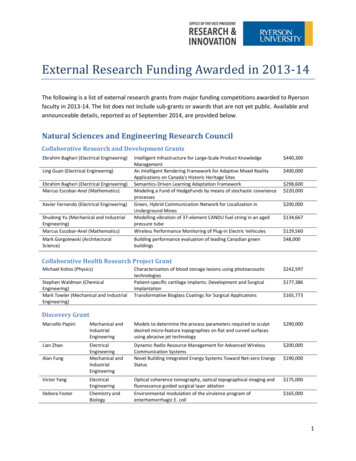
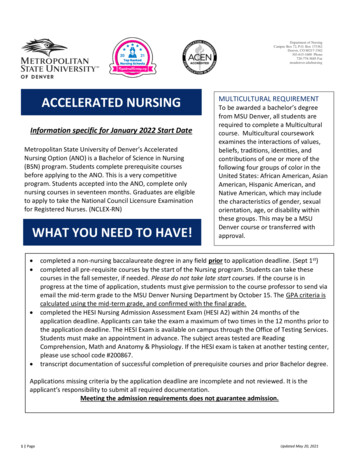
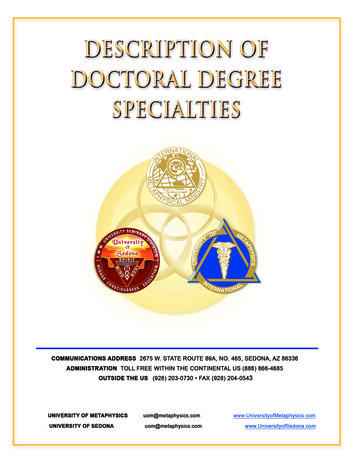
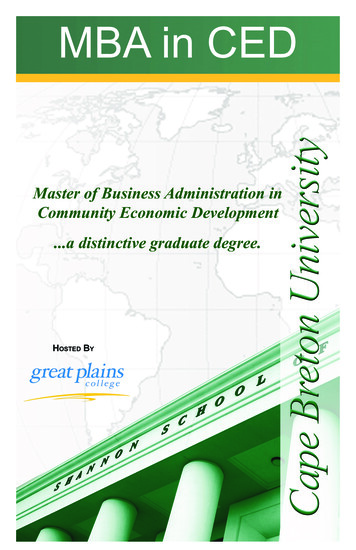
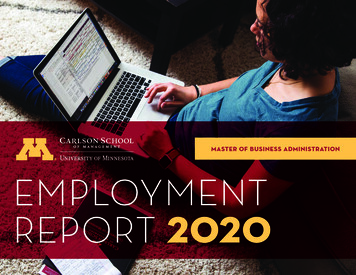
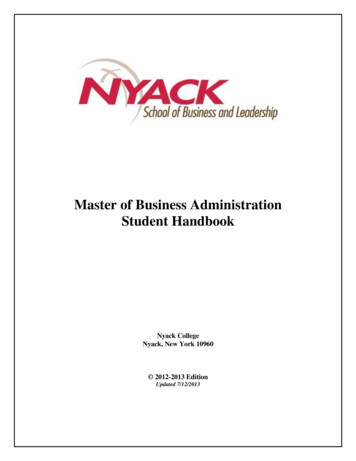
![GLOBAL MASTER IN BUSINESS ADMINISTRATION [GMBA]](/img/9/cat-p-192-i.jpg)
